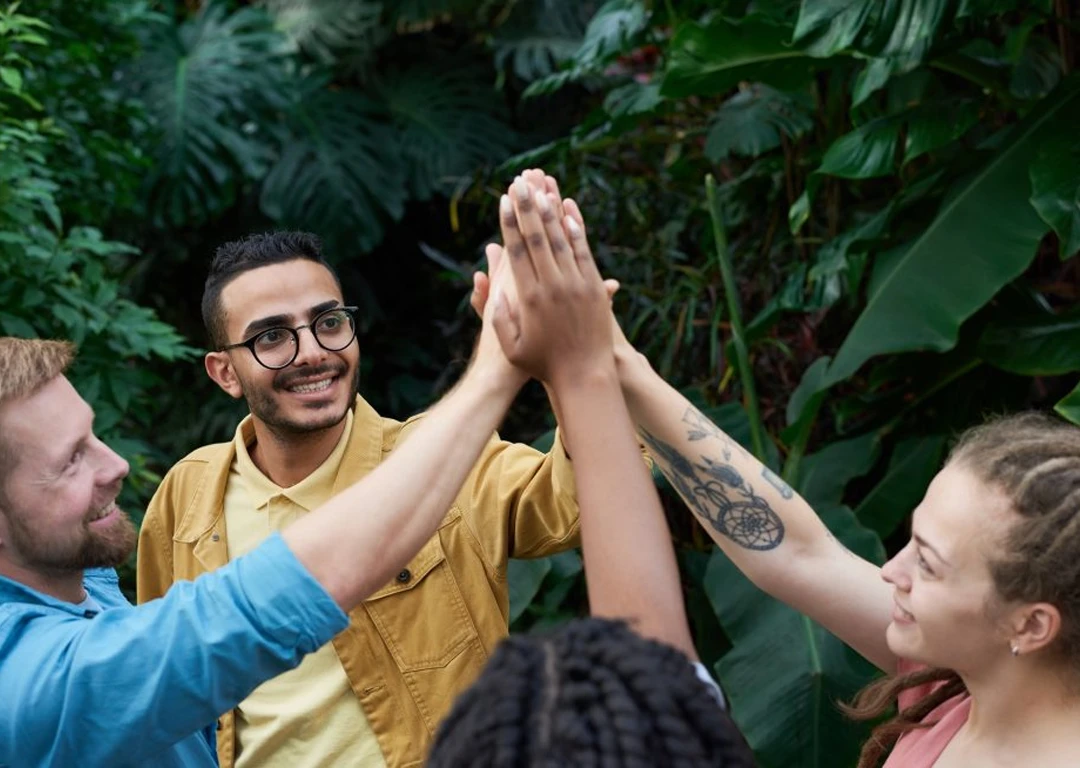Team-building exercises are a great way to help employees trust and rely on one another. They can also help to improve communication within teams, and boost morale.
When it comes to team-building questions, there are no right or wrong answers - the goal is to simply get people thinking about how they work together. In this blog post, we will discuss 15 creative team-building questions that can help your business build trust at work!
What Are Team-Building Questions And Why Do They Matter?
Team-building questions are designed to help groups of employees work together more effectively. By encouraging communication and collaboration, these questions can help to foster a more positive work environment.
Additionally, team-building questions can help to identify areas where employees need improvement. By identifying strengths and weaknesses, team-building questions can help managers develop targeted training programs that address specific needs. Ultimately, team-building questions can play an important role in improving workplace productivity and morale.
15 Creative Team-Building Questions That Can Help Build Trust At Work
Trust is essential for any team to function effectively. These fifteen unique team-building questions will help your team develop trust and work better together.
- What are some things you do outside of work that help you relax and de-stress after a long day at the office?
- What is your favorite animal and why?
- If you could visit any location in the world, where would it be and what would you do there?
- What is something that scares you?
- What was your first job and what did you learn from it?
- Why do you think trust is so important in the workplace, and how can we build more trust with our colleagues?
- What is a story you have always wanted to share but never get the opportunity to do so?
- Who or what motivated you to seek the profession you now have?
- Which TV program was your favorite as a child?
- What job did you want as a child?
- Do you have any special family traditions?
- What is your favorite part of the day and why?
- What is a secret talent you have?
- What's the most important thing about trust?
- When was a time when someone betrayed your trust? How did you react and how did it make you feel?

Different Types Of Team-Building Questions
Team-building exercises are important, but it can be hard to come up with new ideas.
We've got you covered. Here we go over the different types of question that will help your team get to know each other better and develop life-long connections.
Ice-Breaker Questions
Ice-breaker questions are designed to help people get to know each other. They can be used in social situations, such as parties or business events, where people may not know each other well.
These questions can help people learn about each other's interests, experiences, and backgrounds. Ice-breaker questions can be serious or light-hearted, but they should always be respectful. Some examples of ice-breaker questions include:
- What is your favorite food?
- Where did you grow up?
- What are some of your hobbies?
- Are you a dog person or a cat person?
- Who was your favorite cartoon character?
- What’s your favorite breakfast food?
- Do you have a favorite family tradition?
There are many benefits to using ice-breaker questions for team-building. For one, it can help team members get to know each other better and build relationships.
It can also help to increase trust and communication within the team. Additionally, ice-breaker questions can help to break down barriers and promote collaboration.
And finally, it can simply be a lot of fun! When used effectively, ice-breaker questions can help to create a more cohesive and productive team.
Funny Questions
Questions can be a powerful tool for sparking conversation and building relationships. When it comes to finding fun team-building questions to ask, the sky's the limit. There are no hard and fast rules, so feel free to get creative.
- What is your favorite comedy movie, TV show, or book?
- What is a time when you laughed so hard you cried?
- What’s your favorite knock-knock joke?
- Do you have a secret guilty pleasure?
Whatever you do, make sure you keep things light and fun - after all, that's what funny questions are all about!
Deeper Questions
When you're getting to know someone, it's natural to stick to small talk. But what if you want to get to know someone on a deeper level? Asking deeper questions can help you build more meaningful relationships with the people around you.
- What are their motivations for doing the work that they do?
- What are their goals and why do they have those goals?
- What are some major life events that helped shape them into the person that they are?
- Which historical figure do you admire the most and why?
Whether you're looking to get to know a new colleague or get closer to your friends and family, deeper questions can help break the ice and encourage people to open up.
Deeper questions also promote bonding and collaboration within teams. By encouraging team members to share their thoughts and feelings, deeper questions can help create a more cohesive and supportive team environment. So next time you're looking to build rapport with someone, ditch the small talk and ask a few deeper questions.
Background Questions
When you first meet someone, it can be tough to know what kind of questions to ask to get to know them better. You don't want to come across as interrogating them, but at the same time, you want to find out more about who they are and what they're interests are. Here are some great questions to ask to get to know someone better:
- What's your favorite hobby?
- Do you have any siblings or pets?
- What's a place you've always wanted to visit but haven't had the chance?
- Do you prefer spending time indoors or outdoors?
- What's your dream job?
- Are you a morning person?
- Would you rather be a part of an in-person or a remote team?
- What’s your morning routine?
- What's your favorite movie or book?
- What kind of music do you like?
Asking questions like these will not only help you get to know the other person better, but it will also give you a better sense of whether or not you have things in common. And who knows - maybe you'll even find a new friend in the process!
Why Do Businesses Use Team-Building Exercises To Improve Communication And Morale Among Employees?
Good communication is essential for any business to run smoothly. It helps employees stay on the same page and avoid misunderstandings that can lead to mistakes.
Unfortunately, communication can often break down, especially in large businesses where employees may not have a lot of personal interaction. In these cases, team-building exercises can be a great way to improve communication and morale.
By working together on tasks and getting to know each other better, employees can build trust and learn how to better communicate with each other. As a result, team-building exercises can help businesses run more smoothly and efficiently.
The Benefits Of Team-Building Exercises For Building Trust
Building trust is essential for any team to function effectively. Trust allows team members to feel comfortable taking risks and sharing ideas, knowing that their colleagues will support them.
It also allows for open communication and collaboration, as team members feel confident that they will be heard and respected. There are many different ways to build trust within a team, but one of the most effective is through team-building exercises.
These exercises can help team members get to know each other better, learn to communicate more effectively, and identify each other's strengths and weaknesses. As a result, team-building exercises can be a powerful tool for building trust within a team.
By engaging in activities that force employees to rely on one another, team members can learn to trust and rely on one another in the workplace. Here are some benefits of team-building exercises for building trust: 
Encourages Communication
One of the most important aspects of trust is communication. In order to trust someone, we must be able to communicate with them openly and honestly.
Team-building activities encourage employees to communicate with one another in order to complete the task at hand. This type of communication can be transferred to the workplace, where employees will feel more comfortable communicating with one another about work-related matters.
Builds Rapport
Rapport is a close and harmonious relationship in which the people or groups concerned understand each other’s feelings or ideas and communicate easily. In other words, rapport is built when we feel comfortable with someone and can easily communicate with them.
Team-building exercises help employees to build rapport with one another by providing opportunities for them to get to know each other outside of work. Once rapport is established, employees will find it easier to trust one another and work together more effectively.
Improves Morale
When teams working together successfully complete a task, it can lead to a sense of accomplishment and pride. This boost in morale can carry over into the workplace, where employees will feel more motivated to work together towards common goals.
Additionally, when employees feel like they can trust their colleagues, they will be more likely to enjoy coming to work each day and feel less stressed while on the job.
How To Make Team-Building Questions More Effective
Team-building activities can be a great way to help coworkers get to know each other and build a sense of teamwork. However, it's important to introduce these activities properly in order to get the most out of them.
First, it's important to set the tone and explain why the activity is being done. For example, if the goal is to build trust, be sure to explain that. Then, it's important to give clear instructions and make sure everyone understands what they need to do.
It's important to debrief after the activity and talk about what worked well and what could be improved. We'll go over some other ways to make your team-building questions and exercises more effective.
Understand The Different Types Of Team-Building Questions And What They're Meant To Achieve
There are all sorts of team-building questions out there, and it can be helpful to understand what each type is meant to achieve. For example, icebreaker questions are meant to help team members get to know each other better and feel more comfortable working together.
Conflict resolution questions, on the other hand, are meant to help team members identify and resolve conflicts in a constructive way. By understanding the different types of team-building questions and what they're meant to do, you can choose the ones that will be most helpful for your team.
Choose Questions That Fit The Needs Of Your Team And Organization
When it comes to choosing questions for your team or organization, there are a few factors to consider. First, think about the overall goal you're trying to achieve. Are you looking to improve communication skills, build trust, or boost morale?
Once you've identified the goal, you can start to narrow down your options. If you're looking to improve communication, for example, questions that involve sharing information and working together as a team might be a good fit. If trust is the goal, questions that involve collaboration and mutual support could be a good choice.
And if you're simply looking to boost morale and have some fun, any questions that gets everyone happy and laughing is sure to do the trick. No matter what your goal may be, there's an exercise out there that's perfect for your team or organization.
Make Sure Everyone Is On Board With The Exercises Before You Start - No One Wants to Feel Forced Into Something
Before you start any team-building activity, it's important to make sure everyone is on board. Some people may be naturally shy or uncomfortable with group activities, and it's important to respect their wishes.
However, if everyone isn't on the same page, it can make the exercise less effective and even frustrating. Make sure to explain the purpose of the team-building exercise and what you hope to achieve.
Get everyone's input on what activities they're comfortable with and what they'd like to get out of the exercise. Once you've got everyone on board, you can start your team-building exercises with confidence! 
Set Clear Goals For Each Exercise And Make Sure Everyone Understands Them
When it comes to team-building, it's important to set clear goals for each exercise. This will ensure that everyone is on the same page and understands what they need to do in order to complete the task at hand.
Furthermore, by having clear goals, you can more easily measure the success of the team-building exercise. Was the goal to improve communication? To promote collaboration? To increase trust? By setting clear goals, you can ensure that your team-building exercises are truly effective.
Be Patient - Team-Building Takes Time And Won't Happen Overnight
Anyone who has ever pursued a long-term goal knows that it requires dedication and perseverance. There will be setbacks and obstacles along the way, but it is important to maintain focus and keep moving forward.
With that said, one of the most important qualities for achieving success is patience. Patience allows us to weather the storms and keep our eye on the prize. It helps us to stay motivated when things get tough and to keep trying even when we feel like we're not making progress.
So next time you find yourself losing patience, remember that it is an essential ingredient for success. And with enough dedication and perseverance, you will eventually reach your goals.
Celebrate Successes Along The Way And Learn From Failures
Any successful team knows that it's important to celebrate successes and learn from failures along the way. That's why corporate team-building is such a vitally important part of any business.
It helps people to bond with each other, build trust, and learn how to work effectively with each team member. And, perhaps most importantly, it provides an opportunity for people to learn from their mistakes and grow as a team.
Of course, there will always be setbacks and challenges along the way. But by celebrating successes and learning from failures, teams can become stronger and more cohesive. And that's something that any business can benefit from.
Final Thoughts
When it comes to team-building, there are a lot of different approaches that can be taken. However, one common element that is often included is the use of a team-building question.
Questions can help team members get to know each other better, develop a stronger sense of trust, and identify areas where they may need to work together more closely. In addition, questions can also help to generate new ideas and perspective.
Asking the right questions can help teams to explore new possibilities and find creative solutions to problems. Ultimately, the use of questions can be a powerful tool for building strong and effective teams.


Share:
What To Look For In Leadership Development Programs For Companies
Why Team Building is Even More Critical in 2026